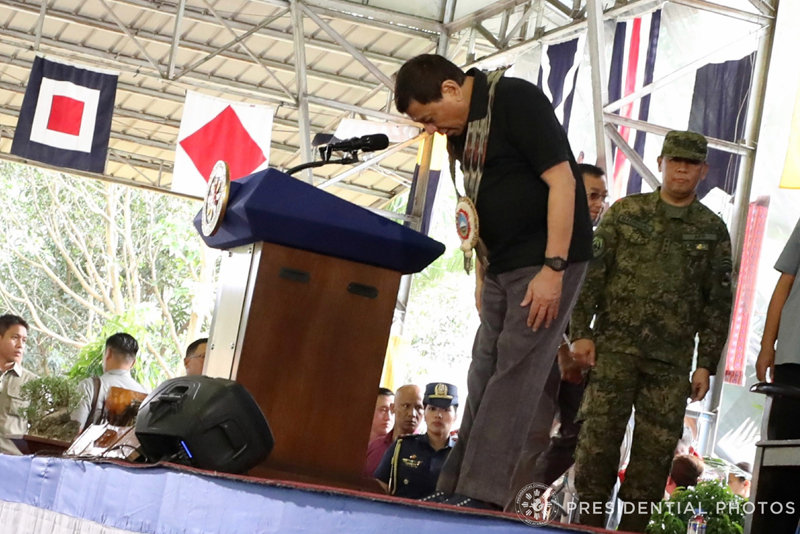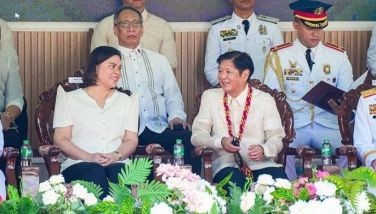Duterte urges Pinoys: Don’t support a dictator

President Duterte makes a gesture of respect before speaking during the Indigenous Peoples Leaders’ Summit at the Naval Station Felix Apolinario in Panacan, Davao City the other day.
MANILA, Philippines — Perceived as an emerging despot by critics and political foes, President Duterte has urged the people to shun a dictatorship as he renewed his promise to work more vigorously to set into motion a federal form of government before the end of his term.
“I am not asking for support as dictator. They won’t allow me. They will shoot me,” Duterte said in remarks at an indigenous people’s summit at the Felix Apolinario naval station in Panacan, Davao City on Thursday.
But he reminded critics that he – as an official elected by the people – should be allowed to do his job.
“You can be sure that after the end of four years and there is still no workable, viable Constitution that is federal and long term, I will step down a day ahead,” the President said.
Duterte, 72, said he knows that the public will not tolerate another dictator.
“They are just looking there. But they are thinking how to burn something if you will be a dictator,” he said.
“The Constitution says we are a democratic country. He may be a son of a b****, but he was chosen by the people, we can’t do anything about it. Election,” he said.
“I won’t be the President for all time because the military and police won’t allow me to extend my term even for just one day,” he added.
Duterte noted that uniformed personnel are – rightly so – more loyal to the flag than to his presidency.
The President slammed anew the communist rebels who wanted him ousted. “That’s for the communists. They want to enter government at the backdoor,” Duterte said.
He reiterated that his pitching for federalism is his way of addressing peace and security concerns, especially in Mindanao, once and for all.
An ally in Congress, Davao City Rep. Karlo Nograles, said the country’s ranking as No. 1 in Asia in terms of budget transparency belies claims by critics that the Duterte administration is a despotic regime.
“This is a bitter pill for administration critics to swallow, but the survey ranking is proof that President Duterte is a champion of transparency. His actions and policies are consistent with this fact,” he said.
Nograles, who chairs the House appropriations committee, cited the 2017 Open Budget Survey, in which the Philippines garnered a transparency or open budget index score of 67/100, placing it in top spot in Asia and 19th worldwide.
He said the score is way above the global average of 42.
The survey is held every two years, meaning it has covered one-and-a-half years of Duterte’s tenure and six months of the Aquino administration, he said.
“How can you have a dictator for a President while his government is also considered as one of the world’s most transparent? The country’s sound fiscal and budget policies emanate from the Office of the President, and is only put into practice by the Department of Budget and Management and of course the House of Representatives, which possesses the power of the purse,” he said.
He noted that shortly after assuming office, Duterte signed Executive Order No. 2, or the Freedom of Information directive for the executive branch.
“What the previous presidents failed to do in their six-year terms, President Duterte did in less than a month. The FOI directive is conveniently being forgotten by administration attackers but they are among those who benefit from it,” Nograles said.
He said while the House is not part of the executive branch, Speaker Pantaleon Alvarez has made a conscious effort to adopt the pro-transparency policy.
“Under the Duterte administration, the House, together with the Commission on Audit, has made it a mission not to waste even a single centavo of taxpayers’ money. Every single centavo is there in the budget book for everyone to see. To say that we enjoy all of these under a dictator makes no sense at all,” he said.
In 2015, during the Aquino administration, the country received the highest score for budget transparency in Southeast Asia, the second highest in Asia and 21st in the world.
It scored 64 out of 100, well above the global average of 48. In 2012, its score was 48/100.
CHR’s reminder
Meanwhile, the Commission on Human Rights (CHR) reminded those involved in Charter change to take into account the essence of the present Constitution that emphasizes the preeminence of fundamental human rights.
“The 1987 Constitution of the Republic of the Philippines has been hailed as a human rights Constitution. The protection it provides to traditional civil and political rights is among the most forceful of any fundamental law of any member of the international community,” the CHR said in a statement.
“Any change must retain, if not strengthen, the constitutional primacy given to human rights and human dignity under the present Constitution and the process of change must be based on transparency, respect for diversity, inclusion and genuine participation,” it added.
The agency said human rights and social justice should continue to be at the heart of any proposed text to amend the Charter.
It added that independent constitutional institutions including the CHR should be maintained and strengthened in view of their importance in a functioning and working democracy.
“It should also continue to recognize that the protection of life, liberty and property, and the promotion of the general welfare of the people are prerequisites to the enjoyment of democracy,” said CHR.
“Any contrary change would be a disgrace to our history, nature and identity as a freedom-loving people of the first democratic republic in Asia. It would be diving back into the abyss of abuse and greed that we have crawled out of as a people,” it added.
The CHR also voiced its preference for constitutional convention as method for amending the Charter.
“It provides the greatest possibility of participation by and representation of the people. Allowing the formation of a constitutional convention with members elected at large and by sector would make the process as inclusive as it could possibly be,” the CHR statement read.
“It would be for greater debate and discussion that would ensure that any proposed change has been strictly scrutinized from multiple lenses from difference sectors of Philippine society. It is the process most akin to the human rights based-approach in governance. And such is a necessity in an extremely diverse society like ours,” it added. – Janvic Mateo
- Latest
- Trending































